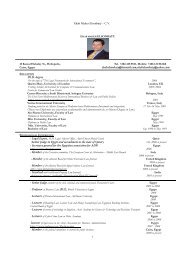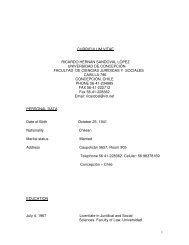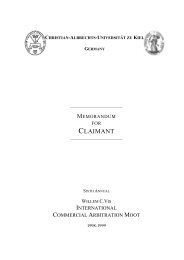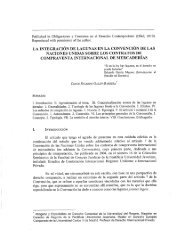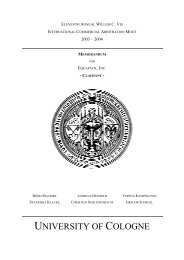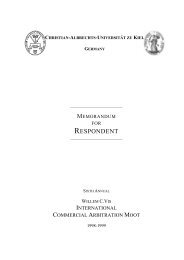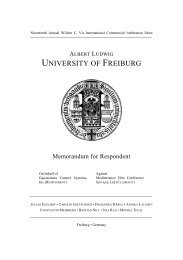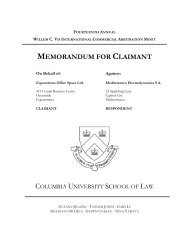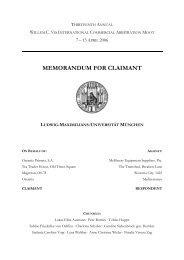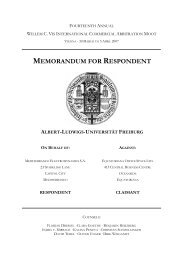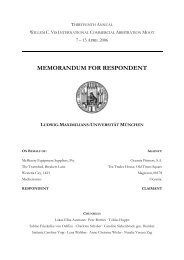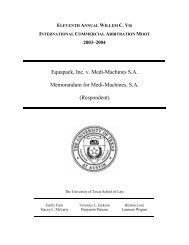MEMORANDUM FOR RESPONDENT - Pace University
MEMORANDUM FOR RESPONDENT - Pace University
MEMORANDUM FOR RESPONDENT - Pace University
You also want an ePaper? Increase the reach of your titles
YUMPU automatically turns print PDFs into web optimized ePapers that Google loves.
QUEEN’S UNIVERSITY FACULTY OF LAW<br />
progressed any further, and the Tribunal has not yet considered the substantive merits of the<br />
dispute, none of the proceedings will need to be repeated [McIlwrath/Savage 263; Zuberbühler et al.<br />
271]. Furthermore, both the jurisdiction and merits of the dispute will be heard by the Tribunal<br />
at the same time [Proc. Ord. 2], so there will be no delay in rendering a final award. As a result, the<br />
cost of proceeding with Respondent’s challenge to the Tribunal’s jurisdiction, in terms of time or<br />
money, is negligible.<br />
21. Moreover, the reconstitution of the Tribunal according to the Parties’ Agreement will not result<br />
in protracted delays of the proceedings. If jurisdiction of the Tribunal is denied, the proceedings<br />
will only be suspended to appoint a new presiding arbitrator. There is nothing to suggest that the<br />
reconstitution of the Tribunal would be unduly prolonged—the Milan Rules set out efficient<br />
appointment procedures and both the Parties and party-appointed arbitrators were cooperative<br />
in the constitution of the present Tribunal. On the other hand, if the Tribunal proceeds to issue<br />
an award and that award is set aside or refused enforcement, the entire arbitral process would<br />
have to be repeated. A Tribunal with the full confidence of both Parties is the best means to<br />
ensure voluntary compliance with an eventual award [Lew et al. 236].<br />
III. IF THE TRIBUNAL AFFIRMS ITS JURISDICTION, AN EVENTUAL AWARD IS AT RISK OF<br />
BEING SET ASIDE OR DENIED RECOGNITION AND EN<strong>FOR</strong>CEMENT.<br />
22. A central duty of a tribunal in any arbitral proceeding is to render an enforceable award [Born<br />
2537; Horvath 135; Lew et al. 119]. If the Tribunal finds that it was properly constituted and<br />
renders an award on the merits, this award would likely be set aside or refused recognition and<br />
enforcement. The courts of Danubia, the seat of arbitration, would have jurisdiction over an<br />
application to set aside an award; enforcement can be sought in jurisdictions where parties have<br />
assets [Lew et al. 703]. There are sufficient grounds for a Danubian court to set aside an eventual<br />
award [art. 34(2)(a)(iv) Model Law] or for courts in Equatoriana or Mediterraneo to refuse it<br />
recognition or enforcement [art. V(1)(d) NY Convention]. Respondent preserved its right to<br />
challenge an award by raising an objection to the Tribunal’s constitution during the arbitral<br />
proceedings [Amd. St. of Def. 1; Born 2592; Binder 61; Zuberbühler et al. 272; Ghiradosi v. B.C.<br />
(Canada 1966) 17].<br />
23. Under art. V(1)(d) NY Convention, an award may be challenged where “the composition of the<br />
arbitral tribunal or the arbitral procedure was not in accordance with the agreement of the<br />
parties” [Luttrell 11; Gaillard/Savage 453]. This provision is mirrored in art. 34(2)(a)(iv) Model<br />
Law. Here, all states involved are signatories to the NY Convention [Req. for Arb. 25], and the<br />
national arbitration laws of Equatoriana and Mediterraneo must be at least as favourable to<br />
8



